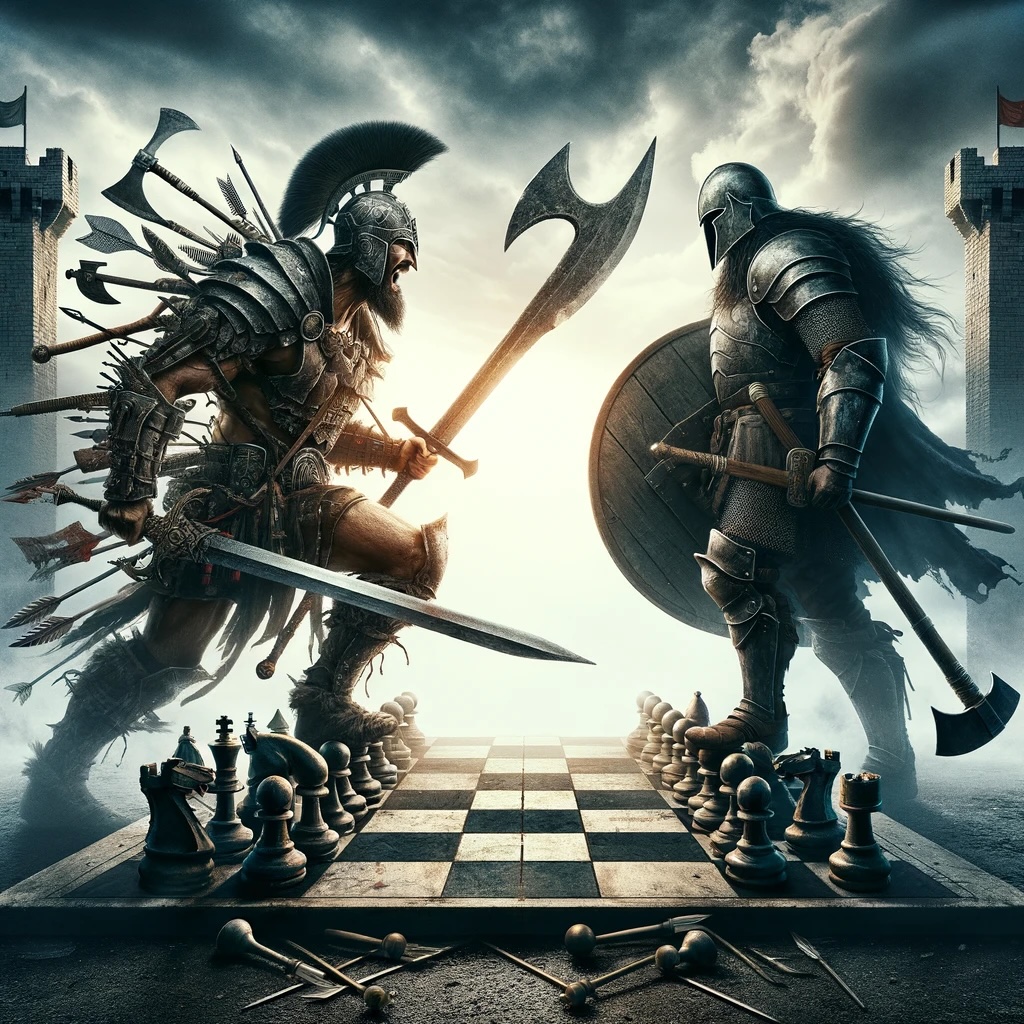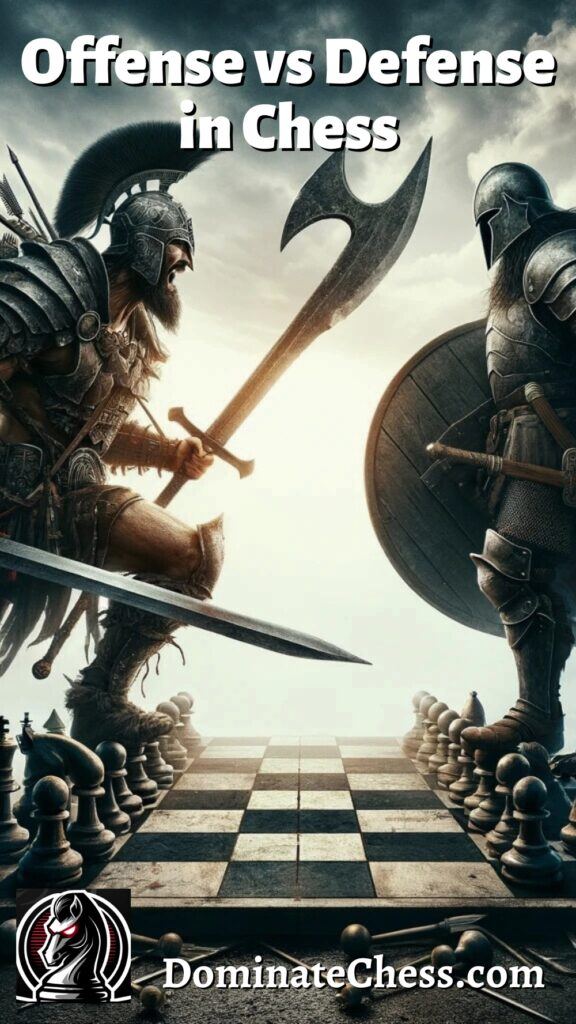Let’s about the intricate balancing act between offense and defense in the world of chess. Think of it as the yin and yang of strategy, where every move holds the potential to tip the balance of power across the 64-square battlefield. So is it better to focus on offense or defense in chess?
Is it better to play offense or defense in chess?
Aggressive offensive attacks can cause your opponent to buckle, but equally impressive is an impregnable defense countering your opponent’s every move. Strike a balance between offense and defense and know when to make that switch
What are the Benefits to an Aggressive Offense?
The short video above is a perfect example of how an aggressive offensive attack can literally leave your opponent with almost no options but to defend and react.
When you play offense in chess, you’re not just making random aggressive moves, you’re exerting psychological pressure on your opponent. It’s about making them dance to your tune, react to your threats, and potentially lose sight of their own strategy.
Imagine witnessing a grandmaster relentlessly pursuing their opponent, driving them to the edge of the board — it’s a psychological edge that can play a significant role in the outcome of the game.
It isn’t just about sheer aggression, it’s also about control. Offensive strategies often pave the way to command the most valuable areas of the board and establish a presence that dictates the pace of the game.
For example, controlling the center early on with pawns and knights gives movement options that can turn into powerful attacks.
In my opinion, choosing to play offensively comes with its set of risks, of course. The pursuit of an attack could leave your own position vulnerable if not thought through. I always feel it’s to my advantage when my opponent comes out with an over-agressive queen.
But here’s the flip side: By applying consistent pressure, you can corner your opponent and force mistakes.
In chess, an attack-oriented play doesn’t mean you throw caution to the wind. It’s a calculated method to maximize the potential for creating opportunities for yourself on the board.
Don’t rush, or you’ll quickly find yourself in a hole. Remember, rushing in chess is almost never a good thing. (Ever played Bullet chess? Sweet mother of god…)
What are the Advantages of a Defensive Strategy?
A defensive strategy in chess isn’t simply about sitting back and waiting; it’s about building a strong position that can withstand attacks and capitalize on your opponent’s overreaches.
Taking a defensive stance early can set the stage very well if done correctly.
One of the great misconceptions about chess is that defensive play is passive. A strong defensive position actively challenges your opponent to find a breakthrough, often leading to frustration and mistakes.
If you want to see the power of defense in action, look no further than grandmasters like Tigran Petrosian, who turned defensive play into an impenetrable art form.
Patience is the unsung hero of defense. I’ve personally watched defensive masters absolutely dismantle their opponent’s offensive attacks. It can be a thing of beauty.
And let’s not forget, a strong defense actively seeks opportunities to transition into a counterattack. It’s that strategic game of give-and-take that can turn the tables in an instant.
Have you tried the French Defense?
What about the Sicilian?
When it Comes to Offense vs Defense in Chess, Is It Even Our Choice?
There is an argument posed in this chess.com forum that when it comes to offense vs defense in chess, it’s rarely even our choice.
“Writers of articles on this site mentioned many times that choosing whether to play “aggressively” or “defensively” is almost never a choice you make. You have to play logical moves and avoid blunders first of all and the rest usually happens on its own.”
User Drawgood at Chess.com
The blunder is the ultimate leveler of the playing field. And once it’s made, it’s all about how you recover.
Just like Mike Tyson said, “Everyone has a plan until they get punched in the mouth.”
When to Switch Between Offense and Defense
Understanding when to switch gears from defense to offense, or vice versa, is what distinguishes good chess players from great ones.
Evaluating the state of the board and understanding positional advantage is key. This will dictate whether you can unleash an attack or whether you should shore up your defenses and wait for a better opportunity.
Learning from historic chess matches can provide invaluable insights. There’s a lot of opportunity in studying how grandmasters made split-second decisions to adapt their strategies mid-game, leading to surprising and, often, game-winning turns.
Finally, don’t sleep on your “chess intuition”, it’s a real thing. Sometimes you have to go with your gut. It’s a strategy I’ve used and it can help keep your opponent on the ropes.
Final Thoughts
You have to have balance to win in chess. Take the initiative, assert and seize control, but know when to counter. Think a few moves ahead, wait for positional advantage, and go with your gut!
What do you think? Are you the aggressive offensive player putting pressure on your opponent? Or do you sit back and play defensively, waiting for your opponent to commit a blunder that you can then take advantage of? Let me know how you feel in the comments section below! I love reading your questions and comments and I always reply back.



I used to love my young days playing chess with my grandpaw. We would sit outside with a fresh homemade glass of sweet tea on Sundays. I actually found that the most effective strategy was not offensive nor defense, but control. I never actively thought about taking pieces or protecting mine. My main goal was always to stay one step ahead of my opponent and that seemed to always work.
I think balance is important. I definitely lean toward offense though. Thanks for the comment!
It’s funny that you talk about strategies in chess. I used to talk to a chess player who told me that defensive strategy is the best because that was the style where you could anticipate your adversary’s moves. But when I read your article, your advice makes more sense. Indeed, you can’t always be defensive. You must adapt your strategy to the current game.
Agreed. I find myself playing defense against better players and ultimately never giving myself a chance to attack. Balance is HUGE, and by leaning towards offense I feel you can put some better pressure on your opponent and hopefully cause a blunder. Thanks for the comment!
Although I haven´t played in a while, my method of playing involved trying my darndest to control the middle. There are times when you have to attack and other times when you feed off the reaction of your opponent.
I admire those chess players who compete or those in clubs. Chess can be a good way to relax and have fun with friends and family.
Agreed! Controlling the middle is key!
“The best defense is an attack”- valid in a real war. In this battle of the mind – chess – defense is a very good strategy when you don’t know your opponent. It is more cautious to wait for the opponent’s moves, in this way you can “feel” him. Is he in a hurry? does he think he’s in control? what sacrifices is he willing to make?
Each game played is unique. The strategy used depends on the opponents. I think that those who play a lot alternately apply the method of attack and defense.
Thanks for the comment!
I don’t know why I decided to get back into chess, but very happy I did. These days I play more and read a lot about chess; I like this game, it’s so funny and trains our brain; I think it helps us to have the most brilliant mind, all the offenses or defenses are essential to us, for winning we have to be smart.
Agreed! Thanks for the comment!
Balance is the key factor in my opinion. I remember when we used to set around family table and playing it. offensive steps could lead to be attacked by your opponent. I think this game improve our brain concentration skills.
Thank you for this article,
Thanks for the comment!
Hi Eric,
I like how you take your reader through the different phases of playing the game. I like that you mentioned that Chess is really focused on balance.
This post also lends way for a reflective moment, as in my opinion, chess is real life being played out in a game. What I personally take from it is humility. Never underestimate the intelligence of someone whether we think they are experienced or not.
I thank you for this amazing post and wish you continued success.
MazieT
Thank you and thanks for the comment!
Awesome article, I’m enjoying going through the site here, learning a lot man!
I think a major setback for me is that I want to try to focus SOLELY on offense, offense, offense… Almost putting any idea of balance completely out of the picture. It’s for sure how I first started learning, just ATTACK at all times and hope for the best basically… 😅
I’ll continue trying my best to take initiative, so I know I’m doing that right, but I need to dial in some more on overall balance depending on how the match plays out…
Another great post! 👍 👍
It’s all about balance! I like focusing on defense sometimes and then keying in on how my opponents attack against it, then I use those attacks myself in other games.